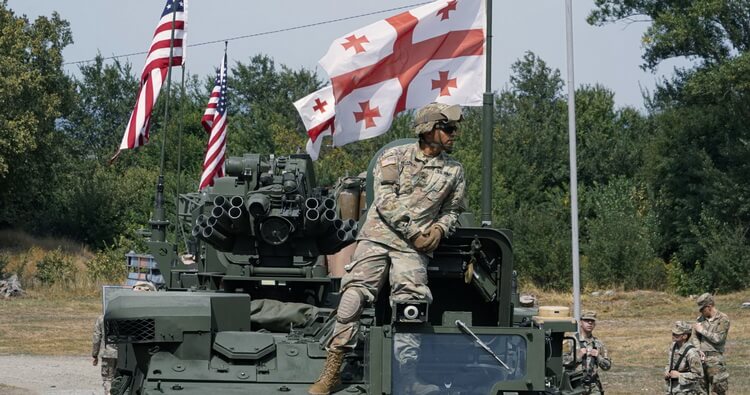Atlantic Council: "End the Russian veto on Georgian accession"

US Soldiers wait near their Stryker vehicle during the tactical road march for the Noble Partner 20 exercise in Georgia. Photo via Atlantic Council/source: Defense Visual Information Database System.

Georgia's NATO accession could move forward with creative decisions on Article 5 of the alliance, in order to break the deadlock on the process and overcome Russia's de-facto veto on the country's membership, an article on Atlantic Council website argues.
Penned by Luke Coffery and Alexis Mrachek of the Heritage Foundation, an American conservative think-tank, the opinion piece details how NATO allies could help Georgia get on track of an actual accession process despite the ongoing occupation of Abkhazia and Tskhinvali (South Ossetia), two of its internationally recognised regions.
Many allies are worried that if Georgia were to be granted membership, then NATO’s Article 5 security guarantee could mean an immediate conflict with Russia over these occupied regions. However, this challenge is not insurmountable," the authors of the article note.
The solution presented for the dilemma is making amendments to Article 6 of the alliance, which details geographical areas where Article 5's clauses apply, to apply the latter to the Georgian territory under the jurisdiction of the Georgian government.
Past examples of such amendments, such as steps taken in the view of Turkey and Greece becoming members, as well as changes made to Algeria's status after its gaining of independence from France, are brought forward as examples of precedence. Other cases of areas outside member countries' territories under Article 5 are also named in the piece.
Georgia’s geostrategic location in the South Caucasus, its professional and capable military (and its political will to use it), and its commitment to liberty and democracy would make it a powerful addition to the stability of the transatlantic community," the opinion piece argues.
Coffey and Mrachek acknowledge the probable attempts by Russia to take advantage of such a move to present the move as Georgia's pulling back from aspirations of restoring territorial integrity over the two regions.
Nevertheless, the two authors argue that Russia's information campaigns are ongoing irrespective of such moves being made, and say NATO and Georgia could launch a "public relations campaign" on the hypothetical initiative to explain its benefits.
Read the full story here.
 Tweet
Tweet  Share
Share
